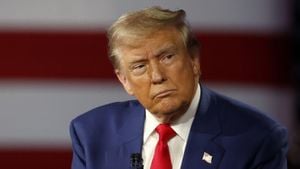Former President Donald Trump has been no stranger to controversy, especially concerning his use of phone calls during his time in office. Now, as the current political climate heats up with the 2024 election on the horizon, these calls are coming under new scrutiny. Were these conversations merely attempts at diplomacy, or were they part of broader, politically motivated maneuvers?
Recent reports shed light on several significant calls Trump made during his presidency. Notably, his conversations with leaders from Ukraine and Georgia have drawn attention from both supporters and critics. On one hand, they exemplify the often-blurred lines between international diplomacy and domestic political interests.
One of the most discussed calls took place between Trump and Ukrainian President Volodymyr Zelenskyy on July 25, 2019. This call, which sparked the first impeachment inquiry against him, involved Trump urging Zelenskyy to investigate Joe Biden and his son Hunter over unproven claims of corruption. Critics labeled this conversation as inappropriate, questioning whether it was proper for Trump to intertwine foreign policy with partisan politics. Supporters, on the other hand, argue he was merely seeking transparency and accountability.
Further complicate matters, another controversial call involved Trump and Georgian President Salome Zurabishvili, which raised alarms due to its timing and content. During this discussion, Trump congratulated Zurabishvili on her election, but critics suggest the conversation may have had ulterior motives linked to U.S.-Russia relations.
The underlying issue remains: Trump’s phone calls might serve dual purposes. Were they legitimate diplomatic outreach efforts, or were they merely political posturing? Observers have noted how Trump often approached international relationships with the same combative style he displayed during his presidential campaigns.
Trump's supporters maintain his calls were meant to fortify alliances and bolster U.S. interests abroad. Indeed, dealing with foreign leaders is part and parcel of the president's duties. Yet, opponents argue these communications often crossed ethical lines, raising concerns about the sanctity of U.S. foreign policy.
Joseph Nye, a political scientist who coined the term “soft power,” states, “The essence of diplomacy is to negotiate through tact and persuasion without coercion.” The contrasting views on Trump's transactions highlight the broader debate surrounding what defines effective diplomacy.
The aftermath of these phone calls continues to play out politically. The fallout from the impeachment proceedings has deeply divided American society, with each side firmly entrenched in their beliefs. While Trump’s base remains loyal, drawing from the idea he was victimized by political enemies, critics express concern about the ethical ramifications of his presidency.
Looking to the future, Trump's phone call tactics may influence his strategy as he campaigns for the 2024 republic nomination. Observers are already speculating whether he will repeat similar practices with foreign leaders, hoping to leverage these connections for political gain once again.
Consider the broader strategy moving forward: will actions like these earn political capital, or could they open the door to additional scrutiny? The delicate balance of international diplomacy is about to face more trials amid the current election climate.
Importantly, the perception of political maneuvering will play heavily on how the American electorate perceives Trump's candidacy moving forward. Drawing from past experiences, it will be fascinating to observe how he leverages his relationships and conversations with foreign leaders and whether they help him or hurt him at the polls.
Much remains uncertain, but one truth is clear: Trump's phone calls have transformed from mere political tool to flashpoints of national debate. Addressing the line between diplomacy and political gain could become pivotal as Trump marches toward his potential 2024 campaign.



